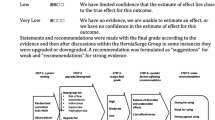Abstract
Purpose
The success of prospective randomized trials relies on voluntary participation, which has been perceived as a barrier for successful trials in children who rely on parental permission. We sought to identify the reasons parents decline child participation to understand potential limitations in the consent process.
Methods
A prospective observational study was conducted in 92 patients asked to participate in prospective randomized trials between 2012 and 2015. Parental reasons for refusal were documented.
Results
The 92 refusals were distributed between studies investigating the management of circumcision, gastroschisis, pectus excavatum, appendicitis, pyloric stenosis, undescended testicles, abdominal abscess and gastroesophageal reflux. Reasons for refusal included preference of treatment path (37 %), inability to follow up (21 %), unspecified resistance to participate in research (18 %), preference to maintain independent surgeon decision (16 %), and desire for historically standard treatment (8 %). Of the families who opted to pursue a specific treatment arm rather than randomization, 35 % had prior experience with that treatment, 32 % had researched the procedure, 18 % wished to pursue the minimal intervention and 15 % did not specify.
Conclusions
Parental preference of therapy is the most common reason for refusal of study participation. This variable could be influenced with more effective explanation of study rationale and existing equipoise.

Similar content being viewed by others
References
Tunis SR, Stryer DB, Clancy CM (2003) Practical clinical trials: increasing the value of clinical research for decision making in clinical and health policy. JAMA 290(12):1624–1632
Emanuel EJ, Wendler D, Grady C (2000) What makes clinical research ethical? JAMA 283(20):2701–2711
Barnett SJ, Katz A (2015) Patients as partners in innovation. Semin Pediatr Surg 24(3):141–144
Ostlie DJ, St. Peter SD (2010) The current state of evidence-based pediatric surgery. J Pediatr Surg 45(10):1940–1946
Yap TY, Yamokoski AD, Hizlan S, Zyzanski SJ, Angiolillo AL, Rheingold SR et al (2010) Informed consent for pediatric phase 1 cancer trials: physicians’ perspectives. Cancer 116(13):3244–3250
Johnson LM, Leek AC, Drotar D, Noll RB, Rheingold SR, Kodish ED et al (2015) Practical communication guidance to improve phase 1 informed consent conversations and decision-making in pediatric oncology. Cancer 121(14):2439–2448
Grootens-Wiegers P, de Vries MC, van Beusekkom MM, van Dijck L, van den Broek JM (2015) Comic strips help children understand medical research: targeting the informed consent procedure to children’s needs. Patient Educ Couns 98(4):518–524
Heerman WJ, White RO, Barkin SL (2015) Advancing informed consent for vulnerable populations. Pediatrics 135(3):e562–e564
Dahl A, Sinha M, Rosenberg DI, Tran M, Valdez A (2015) Assessing physician–parent communication during emergency medical procedures in children: an observational study in a low-literacy Latino patient population. Pediatr Emerg Care 31(5):339–342
Acknowledgments
We would like to acknowledge the following categorical pediatric surgery and research fellows who have helped contribute to not only this study but the success of recent prospective randomized trials completed at Children’s Mercy Hospital: Corey W. Iqbal, Sohail Shah, Pablo Aguayo, Jason Fraser, Jeff Dehmer, E. Marty Knott, Tolulope Oyetunji, Frankie Fike, Vincent Mortellaro, Alessandra C. Gasior, Janine N. Pettiford, Priscilla Thomas, Nicole Sharp, and Hanna Alemayehu. We would also like to thank our research coordinator Kathy Johnson for her assistance.
Author information
Authors and Affiliations
Corresponding author
Ethics declarations
All procedures performed in studies involving human participants were in accordance with the ethical standards of the institutional and/or national research committee and with the 1964 Helsinki declaration and its later amendments or comparable ethical standards. For this type of study formal consent is not required.
Conflict of interest
The authors declare that they have no conflict of interest.
Rights and permissions
About this article
Cite this article
Gonzalez, K.W., Adibe, O.O., Dalton, B.G. et al. Understanding parental refusal of permission for child participation in surgical prospective trials. Pediatr Surg Int 32, 505–508 (2016). https://doi.org/10.1007/s00383-016-3878-1
Accepted:
Published:
Issue Date:
DOI: https://doi.org/10.1007/s00383-016-3878-1



